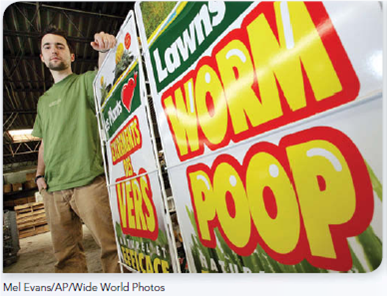
Management 13th Edition by John Schermerhorn,Daniel Bachrach
Edition 13ISBN: 978-1118841518
Management 13th Edition by John Schermerhorn,Daniel Bachrach
Edition 13ISBN: 978-1118841518 Exercise 7
LEARN FROM ROLE MODELS
"This is our strength-creatively solving the 'what the hell do we make from it' issue."
Tom Szaky's Creative Decisions Fuel Sustainability Gains

T om Szaky is founder of the Company TerraCycle that makes consumer products from waste, and an "eco-capitalist"-someone who turns sustainability into profits. While a freshman at Princeton University, Szaky ordered a million red worms, thinking he could use them to recycle campus waste. In conversations with classmate Jon Beyer, the idea shifted to selling liquid fertilizer made from worm excrement. But, they couldn't afford the expensive plastic bottles for packaging.
Many conversations led to the creation of TerraCycle with a mission to "find a meaningful use for waste materials." Szaky's book, Revolution in a Bottle, is all about "upcycling"-the art of turning waste that isn't recyclable into reusable packaging.
TerraCycle upcycles waste products like cookie wrappers, drink containers, and discarded juice packs into usable products like tote bags and other containers. Szaky says: "First we identify a waste stream, then we figure out what we can make from that material. This is our strength-creatively solving the 'what the hell do we make from it' issue."
Szaky's foray into the entrepreneurial world of eco-capitalism could have ended with the red worms experiment. But he and his friends didn't stop there. Learning from experience, they persevered and made decisions that turned ideas into accomplishments.
FIND INSPIRATION
How does Szaky's focus on sustainability match with your views on the environment, ecological conservation, and the planet in general In what ways does this focus reflect a generational shift toward taking responsibility for the environment and ethical manufacturing processes Are there areas of your own life where you can support sustainability-riding your bike, recycling, reusable water bottles, eco-friendly products, and so on Do you see sustainability as an advantage in the marketplace Would you be more willing to buy a product manufactured completely out of post-consumer waste, because it was an upcycled product Why or why not
"This is our strength-creatively solving the 'what the hell do we make from it' issue."
Tom Szaky's Creative Decisions Fuel Sustainability Gains

T om Szaky is founder of the Company TerraCycle that makes consumer products from waste, and an "eco-capitalist"-someone who turns sustainability into profits. While a freshman at Princeton University, Szaky ordered a million red worms, thinking he could use them to recycle campus waste. In conversations with classmate Jon Beyer, the idea shifted to selling liquid fertilizer made from worm excrement. But, they couldn't afford the expensive plastic bottles for packaging.
Many conversations led to the creation of TerraCycle with a mission to "find a meaningful use for waste materials." Szaky's book, Revolution in a Bottle, is all about "upcycling"-the art of turning waste that isn't recyclable into reusable packaging.
TerraCycle upcycles waste products like cookie wrappers, drink containers, and discarded juice packs into usable products like tote bags and other containers. Szaky says: "First we identify a waste stream, then we figure out what we can make from that material. This is our strength-creatively solving the 'what the hell do we make from it' issue."
Szaky's foray into the entrepreneurial world of eco-capitalism could have ended with the red worms experiment. But he and his friends didn't stop there. Learning from experience, they persevered and made decisions that turned ideas into accomplishments.
FIND INSPIRATION
How does Szaky's focus on sustainability match with your views on the environment, ecological conservation, and the planet in general In what ways does this focus reflect a generational shift toward taking responsibility for the environment and ethical manufacturing processes Are there areas of your own life where you can support sustainability-riding your bike, recycling, reusable water bottles, eco-friendly products, and so on Do you see sustainability as an advantage in the marketplace Would you be more willing to buy a product manufactured completely out of post-consumer waste, because it was an upcycled product Why or why not
Explanation
Person TS has established Company TC tha...
Management 13th Edition by John Schermerhorn,Daniel Bachrach
Why don’t you like this exercise?
Other Minimum 8 character and maximum 255 character
Character 255


